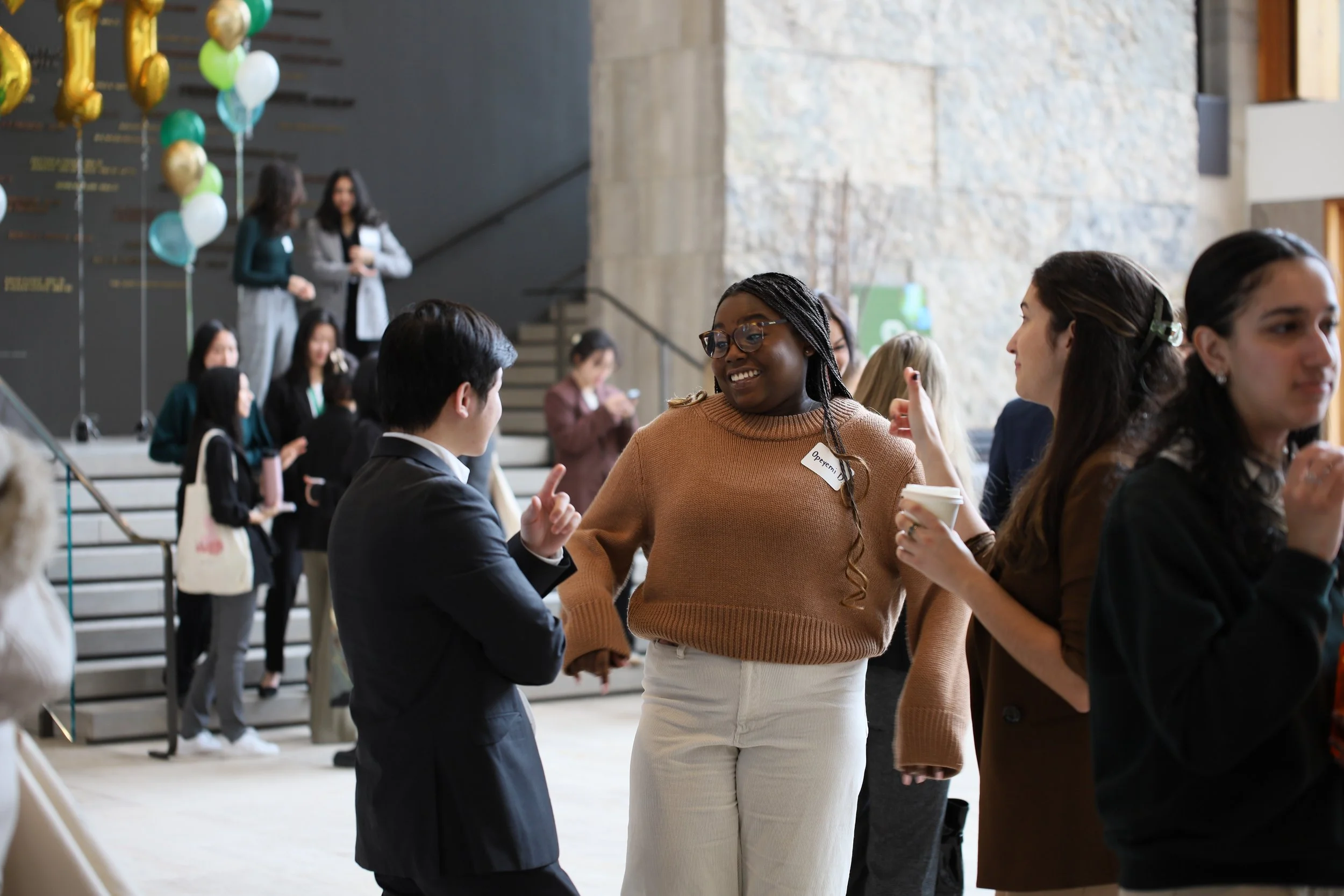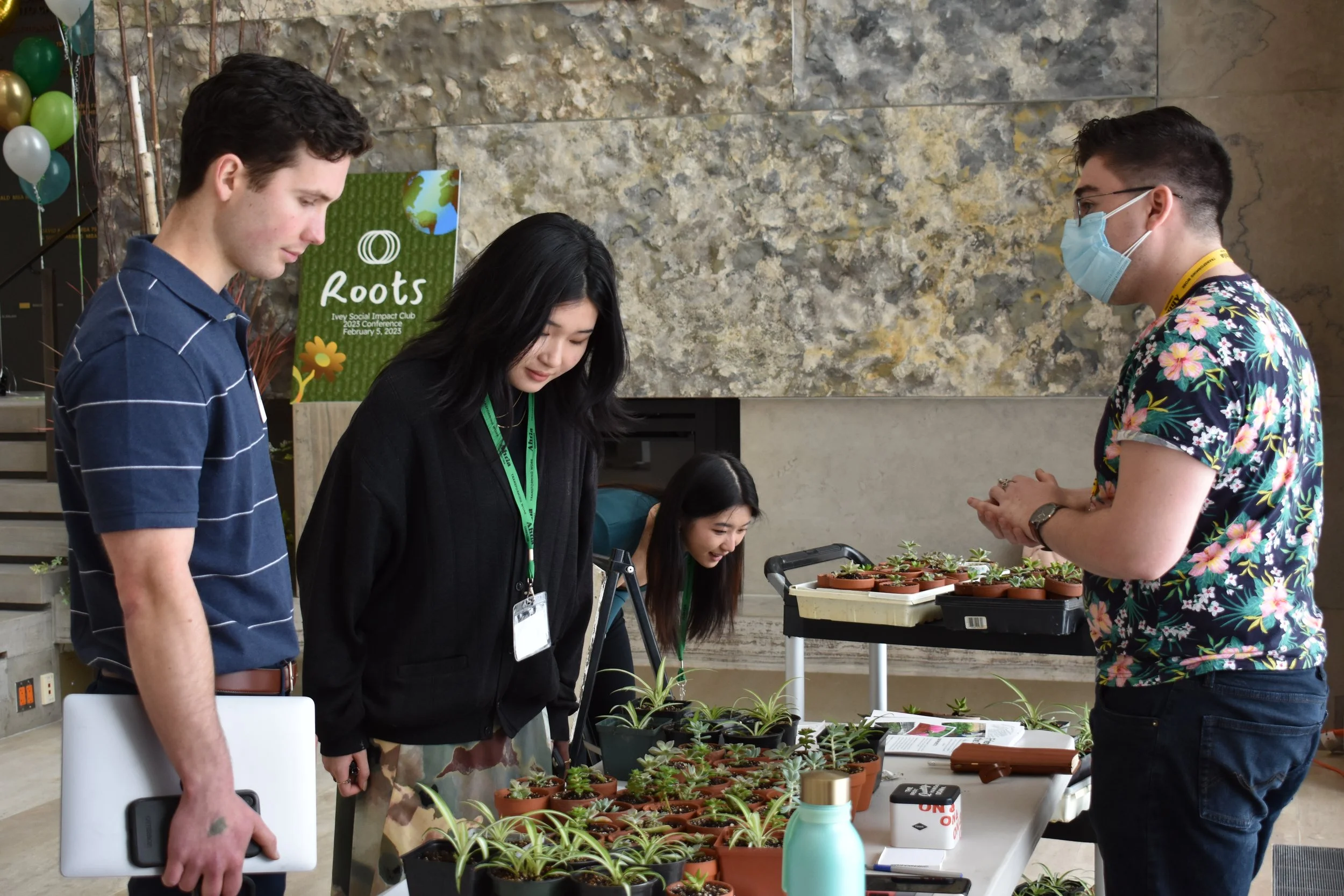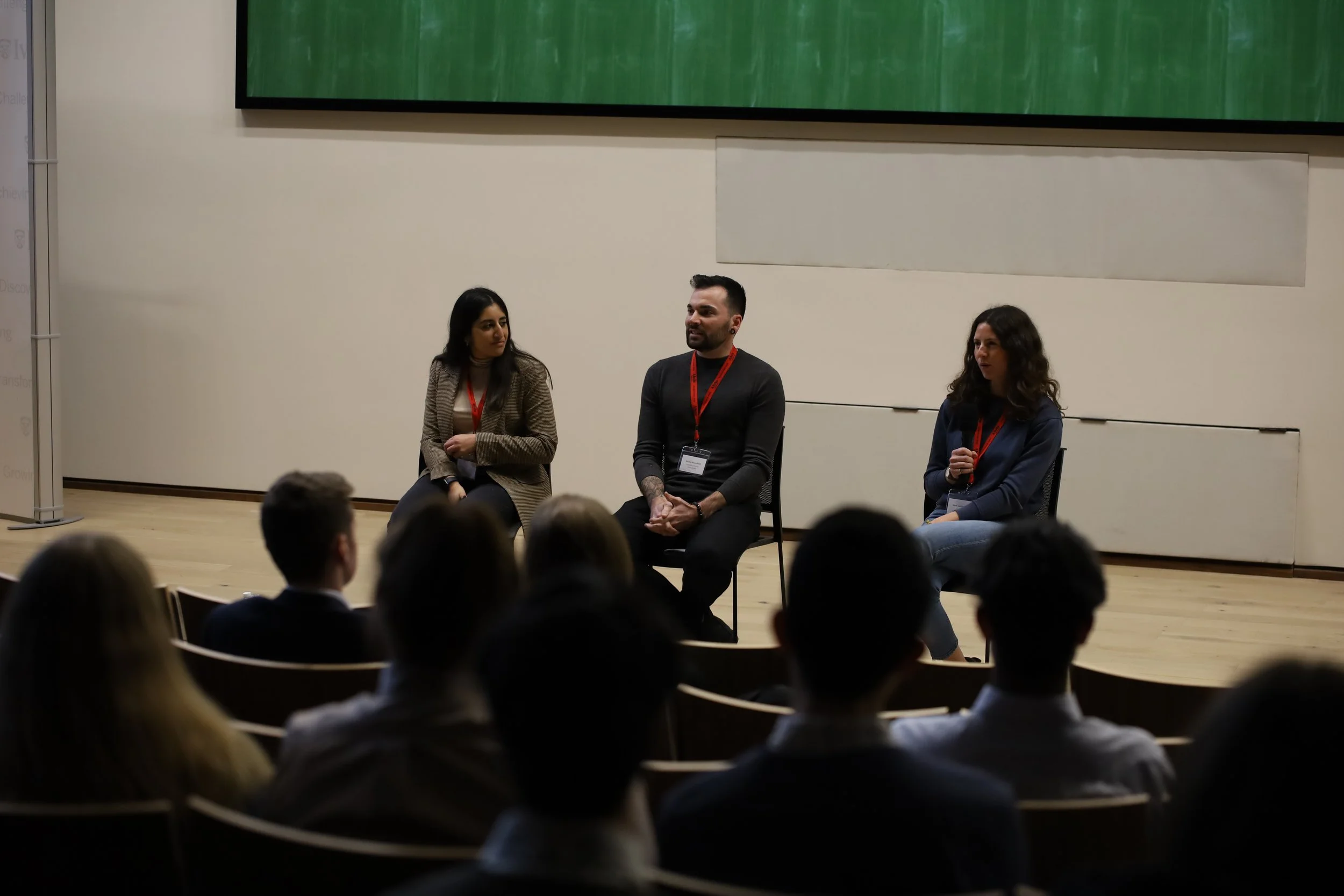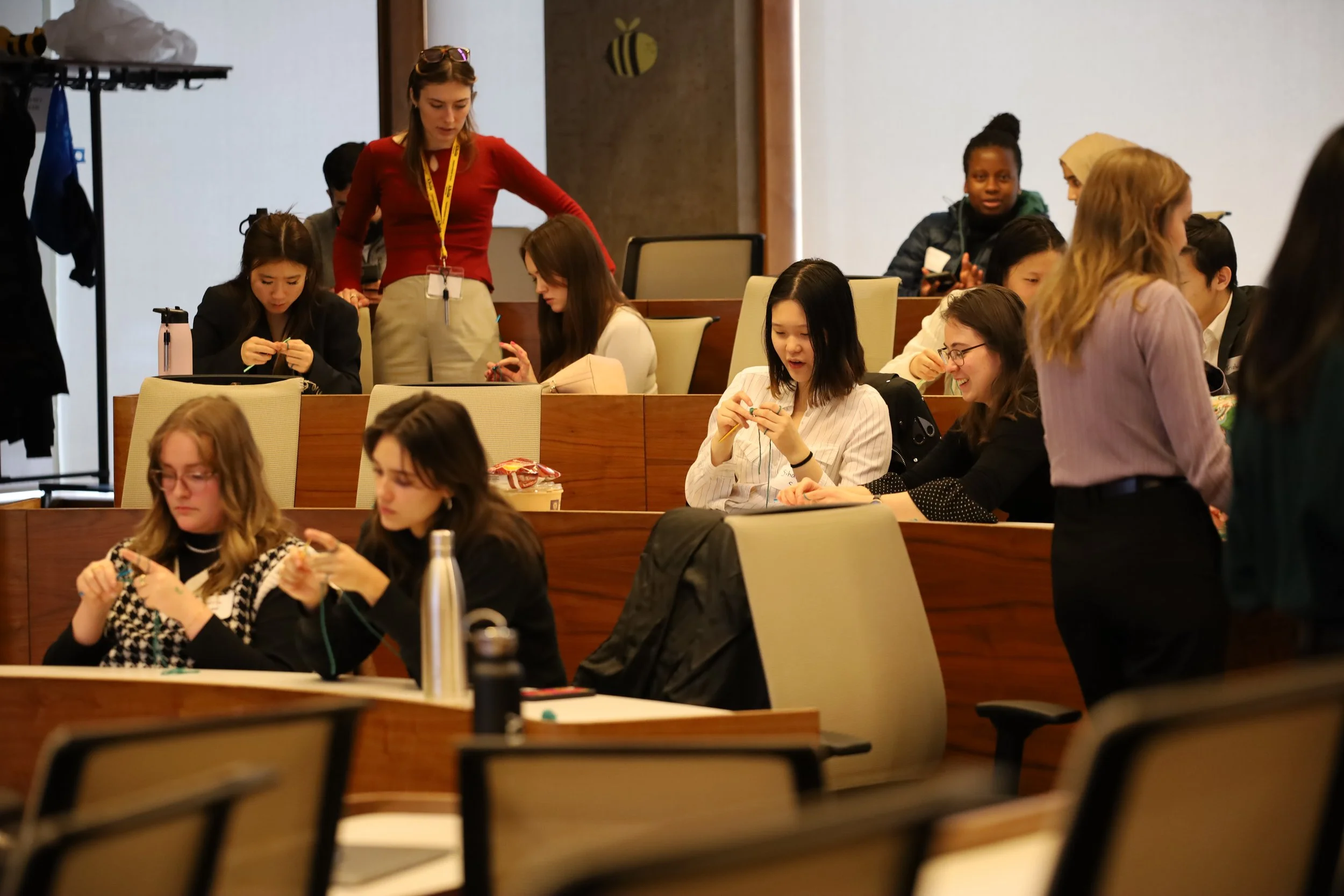The Roots Recap: 2023 Ivey Social Impact Club Conference
By Alicia Zhang, Nick Fox, and Mia Semeniuk • 7 min read
On Sunday, February 5th, the Ivey Social Impact Club hosted its 5th annual sustainability conference, Roots. After two years of virtual gatherings, this in-person event marked a refreshing change for attendees who were eager to connect with like-minded individuals and gain new insights from renowned sustainability specialists. The conference aimed to equip attendees with a diverse toolkit of knowledge, resources, and skills, build confidence to pursue a career in sustainability, and encourage personal exploration of one’s purpose. These goals were brought to life by industry experts from around the world who delivered a series of engaging keynote speeches, panel discussions, and interactive workshops. I left the conference having learned many key insights from these guests, so I’m here to highlight some of the common themes and provide a glimpse into the inspiring discussions that took place at Roots.
Think global and local
During the Sustainability Around the World panel, we were joined by global professionals who shared their unique experiences working in the United Kingdom, Denmark, the United States, and India. From an international perspective, panelists discussed how Canada has a lot to learn in the pursuit of its climate goals and emphasized the importance of adopting successful tools and strategies from other countries.
The panelists also motivated attendees to consider the context of each local community, country, or culture when implementing sustainability practices. Panelist Ashley Wang, Senior Analyst at Social Finance, encouraged the importance of using "context-specific" approaches, recognizing that each company and country is operating within different educational, economic, and legal frameworks. Panelist Daniel Parlak, Manager of Strategic Partnerships at LEGO shared stories of LEGO’s history of plastic contribution and how corporations like itself can begin to transition to a sustainable future.
Sustainability Around the World panel, featuring Arora Akanksha, Daniel Parlak, Nikhil Gowd, and Ashley Wang
Sustainability is interconnected
Our first Keynote speaker Dominique Anglade, former leader of the Quebec Liberal party, mentioned that she views the environment and the economy as one and the same, though it is challenging to convince people that these issues are combined. She went on to tell an inspiring story of supporting those who are more vulnerable and less privileged than yourself, simply because it is the right thing to do.
During Sustainability Around the World, panelist Nikhil Gowd, Fellow of the Global Initiative for the Oxford Character Project, connected sustainability to human rights. Gowd discussed his experience supporting solar infrastructure transitions in India, providing examples of how unstructured renewable energy transitions can cause the dispossession and displacement of people.
We even heard from the creator of modern stakeholder theory, Dr. Edward Freeman, who explained his perspective on the intersection of business, stakeholders, and ethics, and how this has evolved over time. He emphasized the need for stakeholders and shareholders to harmonize; though different, they still must work together. Freeman also used a compelling analogy comparing companies’ profits to our bodies’ red blood cells. While everyone needs red blood cells, creating red blood cells is not our purpose – the same goes for businesses and their financial performance.
Impact Consulting panelist Brennan Wong, Engagement Manager at McKinsey, echoed this idea when he noted that he has observed a large shift to integrating a company's business strategy with its impact strategy, due to a growing realization that impact cannot be separated from business.
These examples underscore how sustainability is inherently intertwined with other pressing and important issues, and that we must view sustainability from a multidisciplinary, multifaceted lens.
Anyone and everyone can help
The Roots conference highlighted that regardless of what sector one works in, there is a wide range of opportunities available to create meaningful change. Dominique Anglade shared her impact experiences working in various fields, including acting in the private sector as a consultant for McKinsey, founding the non-profit KANPE to break the cycle of poverty, and serving in politics as the first woman to lead the Quebec Liberal Party and the first black woman to lead a provincial party in Canada. Anglade’s diverse background paired with her unique experiences showcases how different industries can come together to create a positive impact for people and the planet.
During the Impact Consulting panel, we were joined by Brennan Wong, Katherine Tang, and Sydni Shi, who are consultants that drive sustainable impact at McKinsey, Boston Consulting Group, and KPMG, respectively. These panelists emphasized that extensive previous experience in sustainability is not necessary to foster sustainable impact in your field. Regardless of how much knowledge one has, it's never too late to get started. Instead, individuals can leverage their transferable skills and insatiable curiosity to create change. In addition, reading about new sustainability standards, recent press releases, or major international conferences can help us to build more general knowledge and increase awareness.
Bianca Beraldo’s How To: Break Barriers workshop
Even one person can make a difference
Within large companies, within small companies, and within our personal lives, it only takes one person to catalyze change.
Bianca Beraldo, Credit Analyst and ESG Champion at BMO, led an inspiring workshop called How To: Break Barriers. Drawing on her experiences, Beraldo showcased how trust and personal branding can be used to drive positive change and carve out a space for climate action within a large corporation. Beraldo’s success story involved pitching and executing a partnership between BMO and Habitat for Humanity through careful problem-solving and tactful communication. During this workshop, attendees were encouraged to confront their personal barriers by shredding a piece of paper with a challenge they want to overcome. These shreds were then added to a communal piñata to symbolize a collective action of breaking global barriers through collaboration.
Eric Saarvala, Head of Corporate Sustainability at Raymond James, shared his motivating story of how he ended up in this role. He noticed gaps in the company's sustainability strategy and took the initiative to volunteer and build the company's corporate sustainability framework. In his workshop, How To: ESG 101, he challenged attendees to critically think about idiosyncratic areas within a company’s climate framework that represent opportunities to drive sustainable change. We explored difficult questions like, “What can be done to reach emission reduction targets if your company is in a leased building?” and “How can a workplace effectively measure emissions from hybrid work employees?”. We approached these challenges with innovative solutions such as motion sensors, special insulation for windows, green bicycle initiatives, and changing the procurement process of company paper to sugar sheets. Saarvala reminds us that when it comes to ESG, the “E” and the “S are driven by the G”, emphasizing the importance of effective governance in climate strategy. As some parting words of advice, Saarvala echoed discussions from the Impact Consulting panel, highlighting that you would be surprised about how competitive you can become by simply staying up-to-date with the latest news.
Entrepreneurship and Innovation Panel featuring Nadia Ladak, Richie Bloomfield, and Sarah Landstreet
During the Entrepreneurship and Innovation panel, we heard from three founders of sustainability-related companies: Richie Bloomfield from Urban Roots, Nadia Ladak from Marlow, and Professor Sarah Landstreet from Georgette Packaging. The three founders discussed their journeys through social entrepreneurship and shared insights regarding their experience with customers, investors, and employees. One key takeaway shared was the importance of finding investors that align with your values and mission. Similarly, they discussed the importance of obtaining employee buy-in as an entrepreneur, stressing the importance of a workplace culture that empowers employees with a sense of ownership by allowing them to pursue and lead passion projects on the job.
Attendees also had the option to engage in workshops surrounding sustainability simply for the sake of fun, such as gardening and crochet, allowing attendees to take a hands-on approach to explore multiple areas of interest. In the Gardening Masterclass workshop, Friends of Gardens (FOGS), a group of volunteer gardeners at Western, taught us more about our houseplants (and how we can avoid killing them and discussed the importance of the pollinator gardens they’re building around campus. Attendees got their hands dirty helping FOGS to plant their native seeds in trays and even received a packet of milkweed seeds to take home. One month later, the seeds we planted have already sprouted into seedlings and are soon to be planted in a local pollinator garden. In New Beginnings: Clothing Upcycling & Crochet, HBA1 student Anna Ni taught attendees about the benefits of making your own clothing, showcased the basic mechanics of crochet, and guided us through our first crochet square project.
New Beginnings: Clothing Upcycling & Crochet taught by Anna Ni
Opportunities are growing rapidly
A resounding theme echoed throughout the Roots sustainability conference and the message is clear – sustainability is here to stay. Many industry leaders shared their observations on rising interest towards investments in ESG efforts, seeking emerging climate talent, and expanding their hiring for sustainability positions.
It was particularly inspiring to hear from several panelists who were Ivey alumni and past members of SIC. They reminisced about the club’s early days and commended the scale of which it has become. This rapid growth is a testament to students’ blooming interest and engagement in sustainability, and the momentum behind this movement shows no signs of slowing down anytime soon.
The conference showcased the remarkable expansion of the sustainability field. With nearly 170 registrants from all across Western’s campus, Roots is a promising indication of a changing mindset among businesses and individuals alike. As the need for sustainable practices becomes a top priority, it is exciting to see the rapid evolution of the sustainability movement.
Closing Thoughts
Like a tree growing a strong foundation, we hope that each attendee at this year’s conference was able to strengthen their own roots in the sustainability space. An enormous thank you goes out to each speaker and panelist, sponsor, and our amazing SIC Conference team (shoutout to Firuza, Nick, and Shania). And of course, we couldn’t have done it without each spectacular attendee that dedicated their Sunday to Roots; thank you for sharing your passion with us!
It’s never too late to get involved in SIC! Stay tuned for more amazing opportunities and resources – and next year’s conference!






